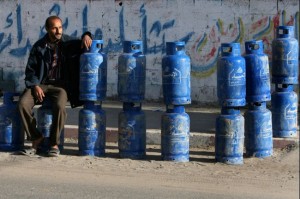
(Mahmud Hams/ AFP Photo/Getty Images)
Economic Experts have condemned the government’s decision on Monday to raise the prices of cooking gas cylinders by 60%, critising the move as a ploy to yield to the demands of the International Monetary Fund (IMF) in order to secure the delayed $4.8bn loan.
“This is part of the IMF loan agenda,” said economic expert Magdy Toulba. “It aims to reduce the subsidies on fuel and to increase prices, and the agenda has all been settled from the beginning of the talks.”
According to the Financial Times, IMF chief Christine Lagarde said the organisation wanted “clear plans from Egypt regarding reducing the budget deficit by increasing revenues, through reducing public sector subsidies including subsidies on food and fuel”.
On Monday, the government set new prices for butane gas cylinders, with the price of 12.5kg cylinders rising to EGP 8 per cylinder and the price of 25kg cylinders rising to EGP 16, a rise of 60% for both sizes of cylinder.
Toulba commented on the timing of the decision, which came just two days before the meeting with the IMF loan delegation taking place on Wednesday. “This is just to show off that the government is following the loan terms gradually,” he said.
“The government cannot execute all the IMF loan terms at once so as not to spark upheavals in the Egyptian street,” explained Toulba.
Toulba added that “such decisions won’t plug the EGP 180bn budget deficit gap anymore”.
“It’s a random decision to speed up our getting the loan,” he continued. “And not one that aims at increasing investments or development.”
“The cooking gas cylinder price rises are a ticking time bomb which will explode in the face of the government and the state,” said writer Tharwat Shalaby on the Gomla Mofeeda talk show broadcast on the MBC satellite channel on Monday. “Especially with the lack of security and the spread of thugs everywhere.”
“This decision will raise the price of cylinders for the consumer by 340%,” added Shalaby, referring to the knock on effects of the price rises throughout the gas cylinder supply chain.
“Actually, this timing is not suitable anymore, and we are going to appeal against the government’s decision,” said Mahmoud El-Asqalani, co-ordinator for the Citizens Against Price Rises (CAPR) organisation.
“Treasury revenues from cylinders were EGP 102m during FY 2011-2012,” he continued. “However, the government has supplied around 36 million cooking cylinders subsided using EGP 16.836bn, which means there is an unidentified loss somewhere, and we are going to appeal against this, too”.
When asked if the decision will plunge Egypt into a ‘revolution of the hungry, Asqalani said: “No, this decision will not push us into a revolution of the hungry; we are already living one.”
Also appearing on the Gomla Mofeeda show on Monday was the Head of the Industrial and Energy Production Committee at the Shura Council Tariq Mostafa, who criticised the decision, predicting it will have “a negative effect on the economic situation, as it will increase cylinder prices for the consumer, which is going to affect other commodities as well”.
He added that as long as the price of cylinders increased, the state should assess a comprehensive policy for the distribution of cylinders in order to “ensure they reach consumers fairly and at the price which the government has assessed [as appropriate]”.
The Taggamu Party participated in a demonstration with trade unions on Tuesday to protest against both the IMF’s delegation arriving in Cairo and the rising cylinder prices, stating in a press release that they refused the IMF loan terms.
“The Egyptian Government headed by Qandil has proved its inability to handle the problems of supplying fuel and maintaining prices,” said the release. “It has also proved that it is following the same policies of the dissolved National Democratic party (NDP) who were about to execute the same price rise, but it stepped back out of fear of sparking the rage of the masses.”
The release added that the government is responding to the conditions of the IMF to raise and eliminate subsidies gradually on fuel prices.
Presidency Spokesperson Omar Amer defended the decision, adding that the “the main focus now is the importance of reducing burdens over Egyptian citizens as much as possible, and there are currently efforts to control prices and to curb them”.
He added that President Mohamed Morsi himself is “personally concerned with easing the burden on the people”.
Economic expert Sherif El-Kheriby also agreed with the price rises: “I’m with the decision, but prices needed to increase more, but this must be enforced using watchdogs”.
He added: “raising prices will help to reduce the interference of those who increase prices and sell gas cylinders on the black market”.
El-Kheriby also suggested that cylinder distributors refusing to implement the decision should have their licences withdrawn instantly.
“This decision is more political than economic,” he concluded.




